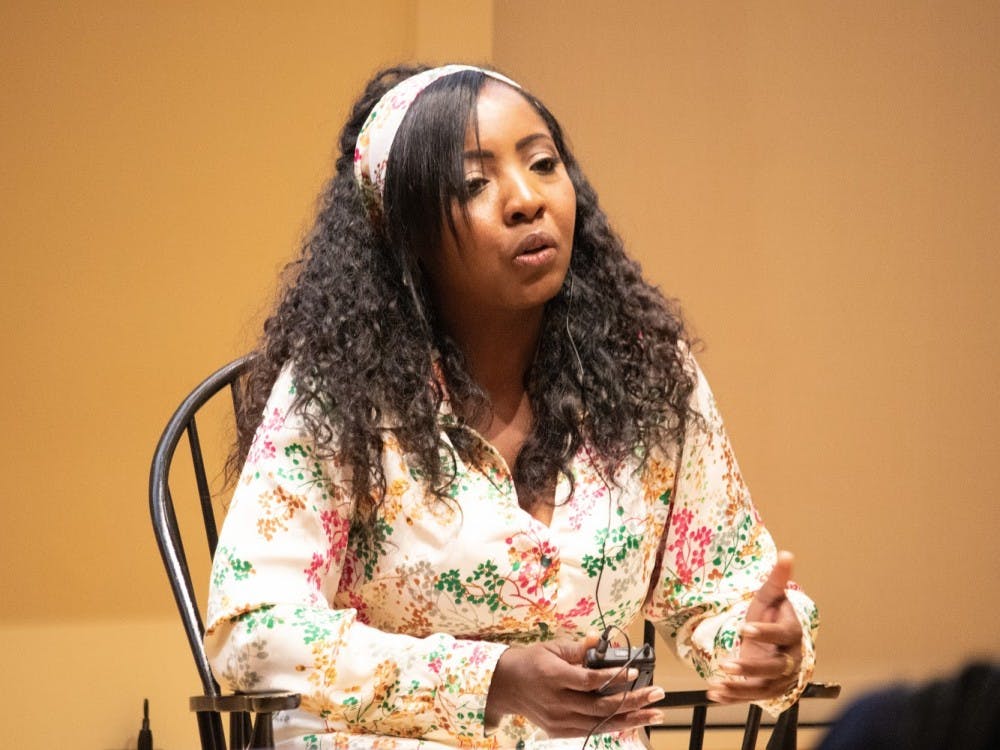The Foreign Affairs Symposium (FAS) opened its first event of the semester with Erlendy Cuero Bravo, a Colombian human rights activist who focuses on the plights of Afro-Colombians, on Monday. Cuero Bravo is the recipient of this year’s Anne Smedinghoff Award, named for a Hopkins alumna, former FAS executive direcotr and diplomat who was killed in Afghanistan.
Cuero Bravo spoke in Spanish to a translator, who then communicated to the non-Spanish-speaking audience members using earpieces. All of Cuero Bravo’s statements were originally in Spanish.
The event was also co-sponsored by the Washington Office on Latin America (WOLA). Gimena Sánchez-Garzoli, WOLA’s director, moderated the event because of her previous work with Cuero Bravo.
Kiana Boroumand, an executive director of FAS, explained why Sanchez was selected as the moderator.
“Gimena Sanchez is an expert on internally displaced persons, ethnic rights, human rights and has done extensive work in Colombia and around issues surrounding Colombia,” Boroumand said.
According to Cuero Bravo, many Afro-Colombians lack basic amenities such as potable water and functional roads. The infrastructure hampers economic development and encourages prostitution. However, the quality of living was even lower before she moved to regions where Afro-Colombians live.
Cuero Bravo recounted her experience of living in Cali, a city southwest of Bogotá, the nation’s capital.
“When I got to Cali, the living conditions were worse,” Cuero Bravo said. “Seeing the children and other women motivated me. I wanted to organize a small community organization. The conditions of conflict in Colombia are still very serious.”
Cuero Bravo works to solve these problems and encourage the government to support displaced people and Afro-Colombians.
Cuero Bravo says that the government only recently acknowledged the existence of the Afro-Colombian community as a separate ethnic group.
“Before [1921], there were no policies that recognized us and protected our rights as Afrocolombianos,” she said.
Afro-Colombians still face many challenges from the government. Cuero Bravo believes that the government is too focused on external affairs and not focused enough on internal displacement.
“It is sad because we have a government today that is more worried about Venezuela than the situation of the nine million displaced people that we have,” Cuero Bravo said.
She says that the prevalence of gangs and penal codes that favor children have encouraged the recruitment of children into criminal activities.
“We are so concerned about our children,” she said. “Now there are criminal bands recruiting children as young as 12. There are strategies where they can pay a kid to kill someone or distribute drugs.”
Columbia recently signed peace accords to end a decades-long conflict between FARC, a terrorist guerrilla drug-trafficking group, and the Colombian government.
Cuero Bravo noted that while both FARC and the Colombian government recognized the poor situation of Afro-Colombians, they only incorporated four pages of a 20-page set of recommendations into the peace agreement.
Cuero Bravo also believes that the government creates too many legal solutions that are too complicated for average people to understand.
“Columbia is an incredibly legalistic country...Colombia is always putting together new laws, legislation and regulations,“ she said. “That keeps people away from looking at the root of the problem.”
Cuero Bravo suffered extreme persecution due to her human rights activities. Many of her family members were murdered. Now, she has a protection system, but she still lives a lifestyle of hiding that she compared to a drug trafficker’s. Her own child was threatened with an assassination attempt.
“When they attempted to kill my child, I thought that if I am going to die defending the work I do, that’s one thing, but I will not stand to allow anything to happen to my child,” she said.
She said that she sometimes feels helpless and depressed when thinking about the plague of violence and her own personal struggles.
“There is a lot of pain there because I know I can’t stop young people from being killed or recruited or falling into drugs and turning into human killing machines,” she said. “So there is a great feeling of impotence.”
Many students were moved listening to Cuero Bravo’s experiences. Senior AJ Tsang was especially struck by her dedication to her faith as her driving force.
“It was really inspiring to hear about how she was able to stay inspired by her faith, even in the face of losing her mother, her father and so many of her other relatives. She kept going, and she kept advocating,” Tsang said.
Students also felt that the event raised awareness about Afro-Colombian issues. They were inspired to continue being engaged in these issues and do further research. Junior Zoya Sattar stated that she thought the talk was particularly illuminating.
“I had no idea about what was going on in Colombia, so this definitely opened my eyes,” she said.
Sophomore Beatriz Ruan stated that she had been keeping up with the news about politics in Colombia because of her Colombian roots. She said that she appreciated Cuero Bravo’s perspective on the issue.
“I was really excited when I first saw the title because I saw that she was a Colombian activist. There are a lot of human rights violations in Colombia that happened throughout the Peace Accords, but as well as the Afro-Colombian aspect, which I hadn’t really taken into consideration,” she said.
Cuero Bravo’s talk was the first bilingual event that FAS had ever hosted. Students appreciated that the event was both in Spanish and English and that Bravo’s words could be understood by a wider audience.
Kathy Ogle was one of the interpreters for the event and was hired through WOLA. She explained the impact she hoped she made through translating Cuero Bravo’s words.
“One of the things that I enjoy most about being a freelance interpreter is playing the role of this bridge,” she said. “[Cuero Bravo] has important things to say, and it’s just a little piece of the puzzle that we can give.”





